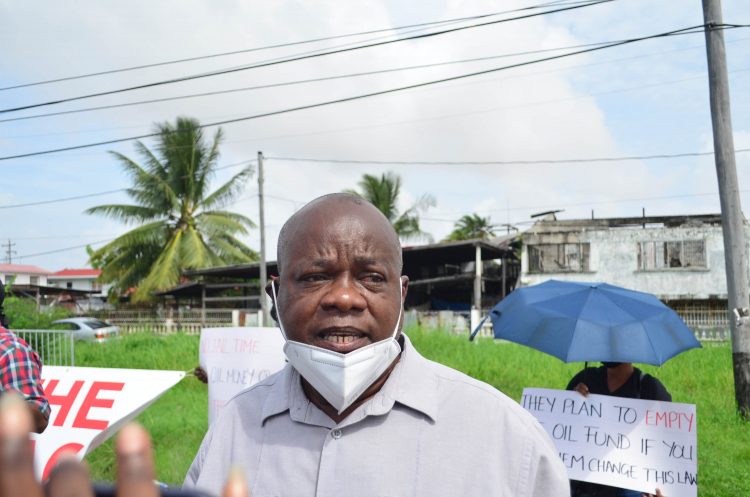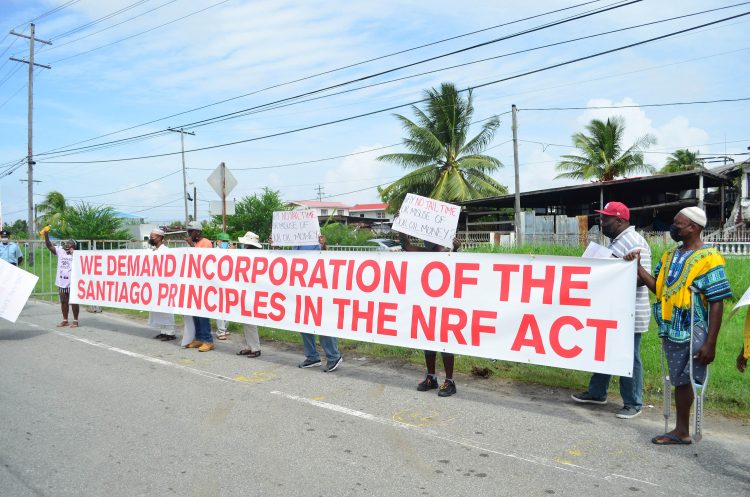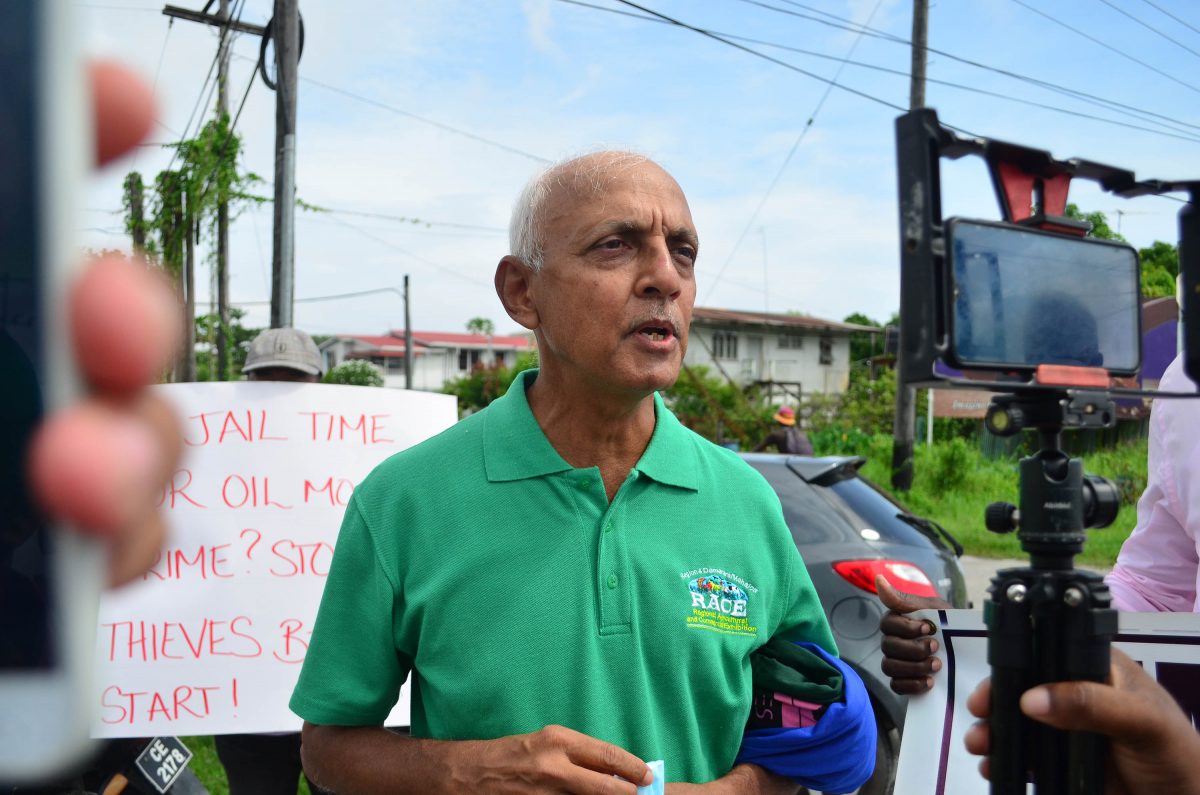Hours before an uproar gripped the National Assembly over the controversial Natural Resource Fund Bill, protesters outside of the Arthur Chung Conference Centre (ACCC) had been vocal in their calls for its scrapping.
The more than 50 protestors, chanted ‘scrap de bill’ and ‘stop de steal, kill de bill’ for several hours as they demanded the incorporation of the Santiago Principles in the NRF Act which was tabled in the National Assembly by Finance Minister Dr Ashni Singh. The bill says the Fund will be guided by the Santiago Principles but several transgressions have already been noted by critics.
The Bill seeks to outline how the government is going to deal with the earnings from petroleum operations offshore Guyana. More importantly, on assent, it repeals the existing Natural Resource Fund Act of 2019 – which was passed post the No-Confidence Motion by the A Partnership for National Unity+Alliance For Change (APNU+AFC) government.


Among the proposals in the new bill, is the replacement of the 22-member Public Accountability and Oversight Committee by a 9-member Committee. It also speaks to the establishment of a Board of Directors to be appointed by the President and a withdrawal mechanism that would allow the government to empty the Fund in the first year once the bill is passed and assented to.
On the picket line, the protestors accused the government of using the legislation to “hijack” the country and engage in “legal thievery.”
“Nothing seems to be working in the favour of the hardworking people in this country. Only a small few can get to the top…the country is being hijacked,” one of the protestors lamented.
Among the demands for the scrapping of the bill was for the government to adhere to the Santiago Principles. Section 2 (4) of the proposed legislation states “The Fund shall be managed according to the principles of good governance including transparency and accountability, and international best practices including the Santiago Principles.”
There are 24 Santiago Principles that speak to the setting up and management of sovereign wealth funds (SWF) and which are considered as the international standard for the management of such funds.
The NRF bill is completely silent on the process for selecting directors of the proposed governance board. It merely says at Clause 5(2) in Part III “The Directors shall be selected from among persons who have wide experience and ability in legal, financial, business, or administrative matters, one of whom shall be nominated by the National Assembly and one of whom shall be a representative of the private sector”.
This provision would immediately offend the Santiago Principles where it states at #7 “The owner should set the objectives of the SWF, appoint the members of its governing body(ies) in accordance with clearly defined procedures, and exercise oversight over the SWF’s operation”.
Opposition Member of Parliament and Shadow Legal Affairs Minister Roysdale Forde told the media outside the ACCC that the Opposition had several plans to ensure the non-passage of the bill. However, he did not elaborate on what plans were in place or how the Opposition would have stopped the passage of the legislation.
“The passage of this bill represents another act another manifestation of oppression on the Guyanese people. This bill is the single worst bill in the history of the Parliament of Guyana. It is a bill that is catering only for the removal of certain controls and restrictions in relation to the assets and oil funds of Guyana. This bill is an important bill, it is a bill that is supposed to preserve the oil fund (and) inter-generational wealth for the country,” Forde said on the sidelines of the picketing exercise.
He accused the Irfaan Ali-led administration of rushing the bill to facilitate its need for total control. When asked whether the Opposition would consider legal action, Forde said “this government fails to have a track record which will give confidence to the Guyanese people that billions of dollars will be spent by them in a responsible manner. I don’t want to say no (to legal action) because there are certain aspects of the bill which are reprehensible, immoral and may well be illegal. So, we as a shadow cabinet will consider it further but I want the public to understand that we will try our best to ensure that bill is not going to pass.”
Newly-minted leader of the People’s National Congress Reform (PNCR), Aubrey Norton also joined the protestors calling for a complete withdrawal of the bill.
“In the (2019) Act was placed mechanisms to ensure good governance in which a broad-based committee of 22 elected persons to manage the Fund, of course under the minister. What the government is seeking to do is to remove that and to put Directors that are chosen by them and if you know the PPP they would choose those who they control and so in essence what they are doing is removing the oversight from a broad-based Guyanese field to a few handpicked PPP few,” Norton alleged.
He further alleged that the bill is an attempt to remove the checks and balances.
“They don’t want checks and balances and they don’t want an independent group to manage it…it spells trouble for everyone…they are seeking to put it in the form of a slush fund…,” he said.
Meanwhile, former APNU+AFC Minister of Communities Ronald Bulkan accused the government of violating the very Santiago Principles it claims to be adhering to.
“Santiago Principles say among other things that it is the owners of the resource who decides how it must be spent. The owners of the resource as we know is not a government, it is not a political party, it is not the Coalition nor is the PPP. The owners are represented in the National Assembly and at a minimum, this bill which is obscene should not be passed today. It should be sent to a special select committee where it can benefit from wider public consultations,” the former Minister said.
He added that the bill seeks to simply set the stage to loot and plunder the resources of Guyana to benefit a select few and called for a more inclusionary process to addressing the NRF bill.
The Opposition and civil society protesters, brandishing placards reading ‘where are the changes to the petroleum laws? We need more’ and ‘stop the greatest heist in Guyana’s history now!’ committed to continue protesting the legislation until it can be amended to address the issues they have raised.
Several Opposition MPs also joined in the protest presenting their parliamentary arguments to the picketers.









